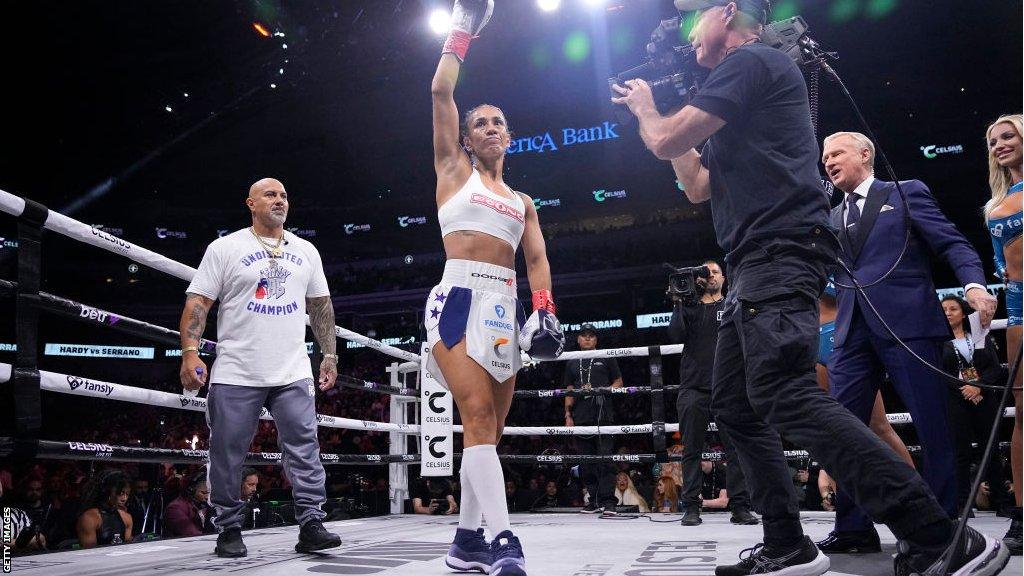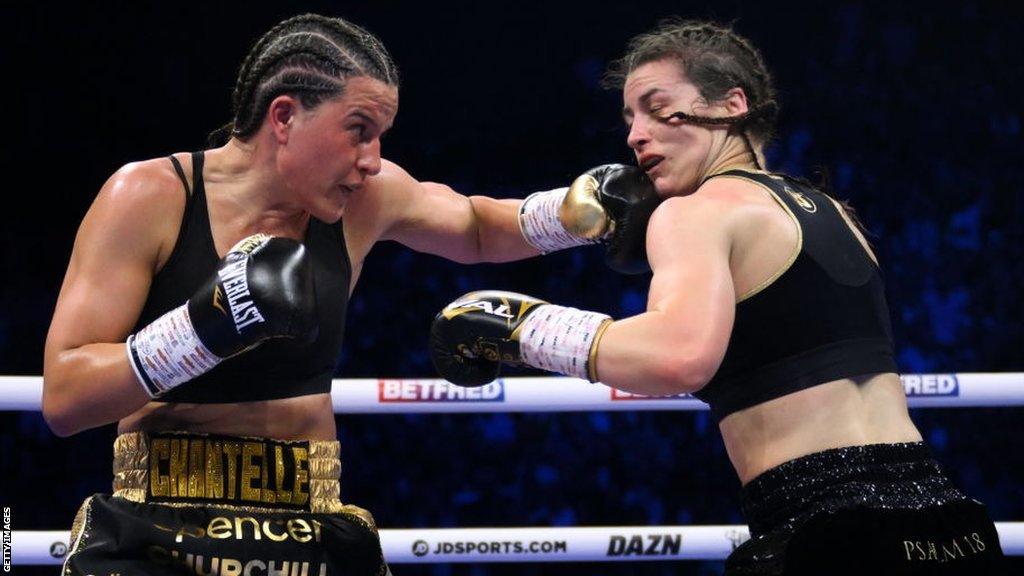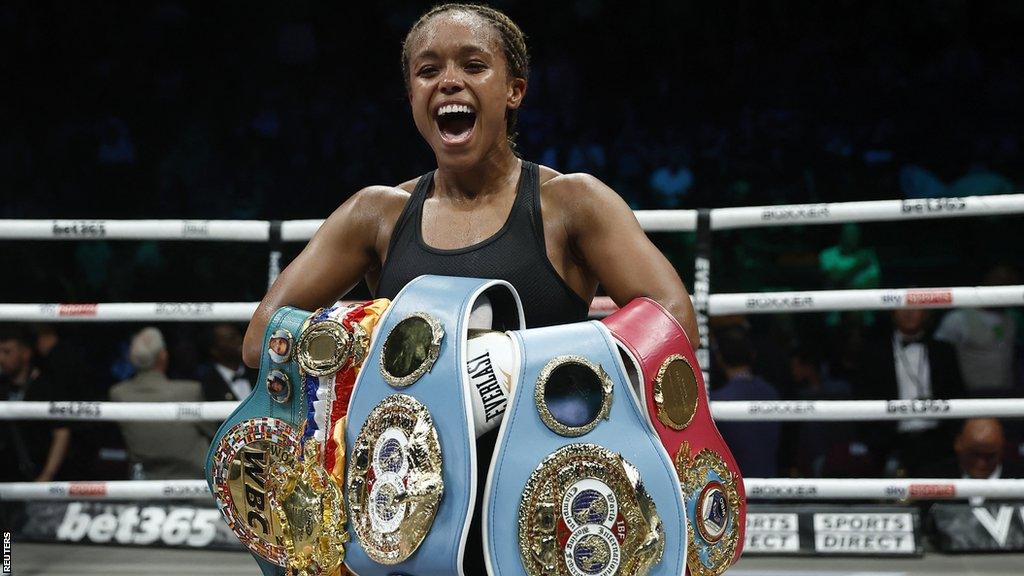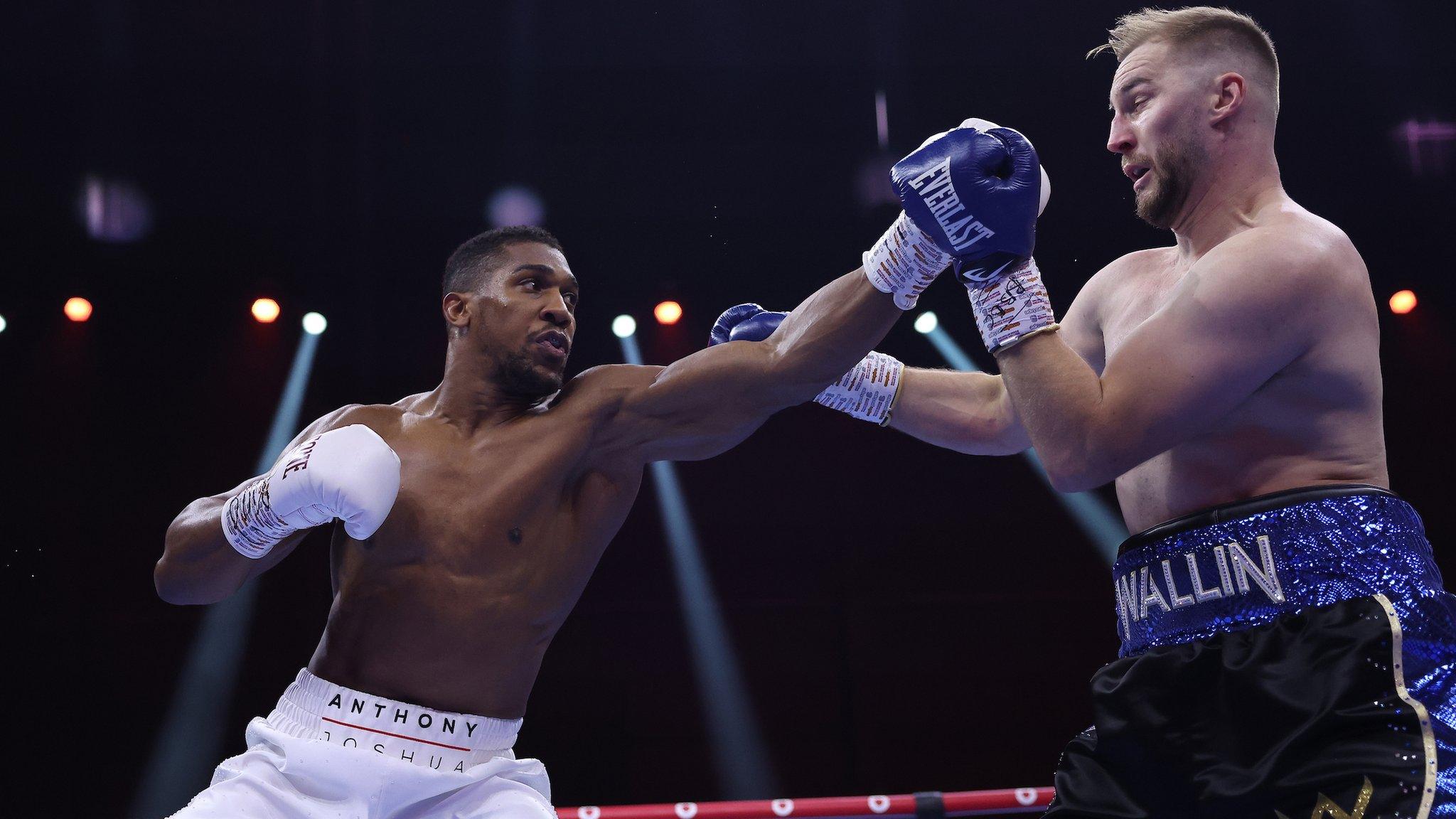Amanda Serrano v Danila Ramos: Should women's boxing universally adopt three-minute rounds?
- Published

Amanda Serrano is the first ever Puerto Rican undisputed world champion
The word 'trailblazer' can be easily thrown around in sport, but boxer Amanda Serrano is a true pioneer in boxing.
Serrano, 35, has won world titles in seven weight classes and last year - alongside Katie Taylor - became the first female headliner to sell out New York's Madison Square Garden.
Her boxing achievements aside, it is Serrano's passion for change and a fight for equality which will leave a mark on the sport.
On Saturday, she will defend her WBO, WBA and IBF world featherweight titles against Danila Ramos over 12 three-minute rounds.
For the first time since 2007, two female fighters will be in the ring for a title fight for as long as their male counterparts - women's championship level boxing is usually contested over 10 two-minute rounds.
Earlier this year, more than 20 current and former women boxers, including Serrano, signed a statement saying they too want to be able to fight three-minute rounds.
"For too long, we have been underpromoted and undercompensated," it said.
"Women's boxing captures the attention of sports fans and creates moments the world will never forget - and we create these moments despite how rarely we are afforded the same time and opportunity to showcase our skill as our male counterparts.
"That is why today, we stand together with the desire and dedication to have the choice to perform on the same stage."
But not everybody supports extending the length of rounds in female boxing.
Serrano's WBC belt will not on the line, with the sanctioning body citing "health and safety" concerns.
"I am praying that there will be no mishap or injury due to this deeply misguided and mistaken initiative," WBC president Mauricio Sulaiman tells BBC Sport.
"Yet those who are allowing it to happen are toying with considerable risks. We know that you cannot play boxing."
Why three-minute rounds?

Chantelle Cameron (left) wanted next month's rematch with Katie Taylor to take place over 12 three-minute rounds
Advocates for three-minute rounds argue the more time spent in the ring, the increased chance of a knockout and consequently a better spectacle.
They feel an extra 60 seconds would allow a fighter to execute a gameplan; sit down on punches, lay traps and reel in an opponent. If a fighter is knocked down but manages to get to their feet, there is still sufficient time to pounce and score the stoppage.
"Personally, three-minute rounds suit me better. I already train three minutes," two-weight world champion Natasha Jonas says.
IBF super-bantamweight world champion Ellie Scotney agrees, adding: "It's just a change of pace. You can set stuff up more and I wouldn't think it would be much of an adjustment."
The statement from Serrano and Ramos - headlined 'choice' - was endorsed by Jonas, undisputed light-welterweight champion Chantelle Cameron and former fighters Laila Ali and Holly Holm.
Rather than implementing universal change, Jonas says the decision of how long a round should last should be left to the competitors.
"The reason I signed Serrano's thing is that there is a choice," she says. "If you want to do it, you can. As long as your opponent agrees."
Scotney, meanwhile, questioned "jumping straight into doing three-minute rounds", and that women's boxing could build into it with the introduction of eight three-minute rounds.
What does the science say?
Not everybody is in favour. Irish boxing superstar Taylor has reservations.
"I think the two-minute round is very high tempo and very fast-paced," she said last year. "They say there will be a lot more knockouts [in 12 three-minute rounds]. Sometimes I don't think there will be."
Promoters Matchroom were also reluctant to entertain Cameron's request for her rematch with Taylor to be over 12 rounds, in part because of the WBC's objection which would remove the undisputed factor from the fight.
WBC's Sulaiman says "safety not popularism is our guideline" and referred to a study by their own medical committee which found "medical and scientific facts, the skeletal structure, muscle mass and physiology of men and women is different".
But Jonas questioned the WBC's study and says there is "too much conflicting information".
The Orthopaedic Journal of Sports Medicine published a study in 2020, external concluding "female athletes appear to sustain more severe concussions than male athletes, due in part to a lower biomechanical threshold tolerance for head impacts".
A year later, however, a case study of 23 athletes, external stated: "Characteristic profiles of head impact exposure differed between boxing and MMA athletes; however, the impact magnitudes were not significantly different for male and female athletes."
Jonas is calling for a further, independent, study on the impact of female boxers contesting longer rounds.
'Women's sisterhood needs support of men'

Current unified light-middleweight champion Jonas was the first female boxer to represent Team GB at an Olympic Games
Jonas acknowledges the move may further the growth of women's boxing but questions whether all promoters are on board.
"There have been promoters who have been in this game for donkey's years and keep the spoils for themselves. Us boxers are the most important part of the sport yet sometimes it feels as if we're the least paid," she says.
"Women's fights are exciting, a little bit cheaper and female boxers have fanbases now.
"But we are an entertainment sport and numbers game and will that go into fairer pay? I don't know if it will. So what's the point?"
Serrano is represented by Youtuber-turned-boxer Jake Paul's Most Valuable Promotions. Paul has been an advocate for equal rights and pay for female fighters and Jonas is calling for more men, particularly established names in the boxing world, to support women's boxing.
"It's alright clubbing together and being a collective women's sisterhood in boxing but we are a male dominated sport so this can't be a full female movement," she says.
Related topics
- Published14 January 2024
